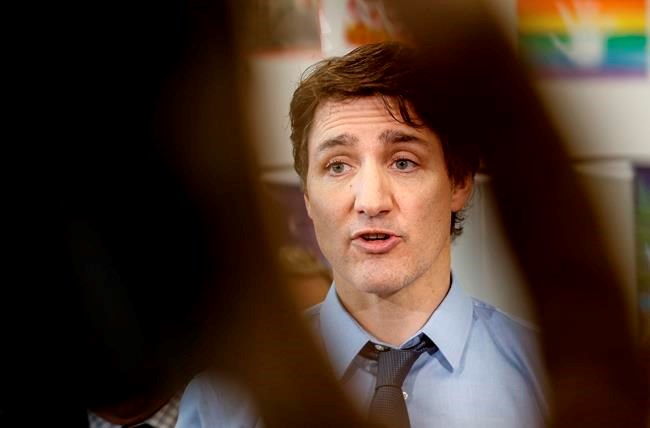OTTAWA — Prime Minister Justin Trudeau says some immigrants to Canada who lack official status need a pathway to help them stay, while in other cases Ottawa must speed up deportation procedures.
His comments come as advocates for gender and sexual minorities say the lack of a regularization program is leaving people without official status in Canada subject to exploitation.
"People who aren't here regularly need to be supported and taken care of," Trudeau told reporters Friday in Winnipeg.
"There needs to be either a pathway towards regularization and citizenship, which I know the (immigration) minister is working on. In some cases, we need to accelerate deportation proceedings,"
The Liberals pledged in late 2021 to "explore ways of regularizing status for undocumented workers who are contributing to Canadian communities." Trudeau said he had no timeline for when this will actually be put into effect.
Immigration, Refugees and Citizenship Canada defines undocumented people as those who have overstayed a temporary visa, remained in Canada following a rejected asylum claim, or arrived in Canada without contacting authorities
The office of Immigration Minister Marc Miller said Friday he is on track to present a proposal to his fellow cabinet ministers before Parliament rises for its summer break next month.
"There's a balance in making sure that the integrity of our immigration system holds," Trudeau said.
"That's one of the reasons why Canadians are, unlike so many other countries in the world, continuing to be positive towards immigration — because our immigration system is rigorous."
Immigration, Refugees and Citizenship Canada says there is no accurate count of how many undocumented immigrants reside in Canada, though it notes academic sources have estimated the number to be as many as 500,000 or as few as 20,000.
"Undocumented migrants live in fear of being detected and removed, and many are extremely vulnerable due to their very limited access to health care and social services," reads briefing material the department prepared for November 2022 testimony to Parliament.
The Migrant Rights Network raised the issue Friday to mark International Day Against Homophobia, Biphobia and Transphobia, noting that gender and sexual minorities are disproportionately represented among foreigners who don't have legal status in Canada.
Swathi Sekhar, a lawyer with the advocacy group Rainbow Railroad, said this is in part due to discrimination within legal systems and volunteer groups created to protect refugees.
"There are LGBTQI+ people that are being deported to places where they may be killed," she said at a news conference in Toronto.
"This kind of regularization scheme could literally be life-saving for many LGBTQI+ migrants who are in this country."
Sarom Rho of the group Migrant Workers Alliance for Change called for a regularization program without a cap on the number of eligible people, adding that Trudeau should "immediately stop all deportations."
She said people are being abused by employers and denied healthcare. "Queer, undocumented people are facing deportation to countries where same-sex relationships are criminalized, conversion therapy still exists, and in some cases death penalties are legalized."
Charles Mwangi, a bisexual man from Kenya, said he has lived in Canada for just under five years despite having a refugee claim and appeal denied. He is slated for his last appeal next month.
"I fear for my life back home because I will be killed," said Mwangi, who has worked off the books in a care home and suddenly lost his job with no recourse. He said he's also faced arbitrary rent hikes, because he can't seek help from authorities.
An undocumented healthcare worker from Uganda who goes by the name Jane said she cannot return to her country, which passed a law last year that jails people who identify as gender and sexual minorities, and calls for the death penalty for certain same-sex acts.
"When I walk down the streets and I see police, my heart starts racing because I'm afraid to be stopped and deported," said the woman, who withheld her last name for safety reasons.
She said she's lived in Canada for seven years but is still abused by colleagues who have legal status, because they assign her more work than what she's paid for. "They used my situation to exploit me. They had the right to talk to their bosses because of their status, but I didn't," she said.
The Immigration Department has already run short-term pilot projects, such as a Guardian Angels program during the COVID-19 pandemic that allowed 8,500 pending and failed refugee claimants who worked in direct patient care, or their family members, to get permanent residency.
Another program for the Greater Toronto Area called the Public Policy for Out-of-Status Construction Workers, had allowed 441 workers and 588 dependants to access permanent residency as of last August.
This report by The Canadian Press was first published May 17, 2024.
Dylan Robertson, The Canadian Press




